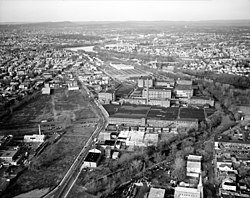Botany Mills
 From Wikipedia - Reading time: 3 min
From Wikipedia - Reading time: 3 min

Botany Mills was a Passaic, New Jersey, manufacturer of textiles,[1] which was organized in 1887.[2] It merged with Continental Textile Co., Ltd., in January 1927. Botany Mills continued to have a controlling interest in both Botany Worsted Mills and Garfield Worsted Mills.[1] The company was a key target of the 1926 Passaic Textile Strike, which lasted almost a year. The business is significant for having survived the Great Depression while continuing to be a leader in its field in the decades afterward.
Corporation history
[edit]Botany Mills' stock listed on the New York Stock Exchange reached a low for 1929 in late September, a month prior to the 1929 Stock Market Crash.[3] The company's net loss of $2,768,904 for 1929, exceeded the 1928 deficit which totaled $1,461,783.[4]
In June 1932 Botany Mills formed an independent bondholders protective committee which called for immediate deposits of bonds. The firm had descended into receivership after defaulting on the payment of interest on its bonds on April 1, 1932.[5] The Empire Trust Company served as depositary for the committee.[6]
In October 1948 Botany Mills announced that it would absorb higher raw material and labor costs without raising prices on goods. They maintained prices on wool shirts and pants as well as on their swimming trunk line. However their gabardine boxer shorts increased in price from $6.95 to $7.50 retail.[7]
In August 1954, Daroff and Sons, a Philadelphia clothing manufacturer which had produced worsteds for Botany under contract for several years, purchased a controlling interest in Botany Mills.[8]
In late 1955, Botany left the textile business and transferred its Passaic plant to an affiliate company, Clarence Worsted. Botany transitioned into real estate, product licensing and cosmetics.[9]
References
[edit]- ^ a b "Form New Textile Company". Wall Street Journal. 1927-01-04. p. 12.
- ^ Obituary Notes, The New York Times, February 21, 1912, pg. 11.
- ^ "Broad Street Gossi". Wall Street Journal. 1929-09-28. p. 2.
- ^ "Botany Mills Has Net Loss of $2,768,904". Wall Street Journal. 1930-04-07. p. 7.
- ^ "Receivers Named for Botany Mills" (PDF). The New York Times. 1932-03-29.
- ^ "Botany Mills Group". Wall Street Journal. 1932-06-23. p. 8.
- ^ "Botany Mills to Absorb Cost Rise, Hold Spring Slacks, Shirt Prices". Wall Street Journal. 1948-10-26. p. 11.
- ^ "Control of Botany Mills is Bought by Daroff & Sons, Clothing Maker" (PDF). The New York Times. 1954-08-04.
- ^ "Botany Quits Textiles" (PDF). The New York Times. 1955-12-31.
 KSF
KSF